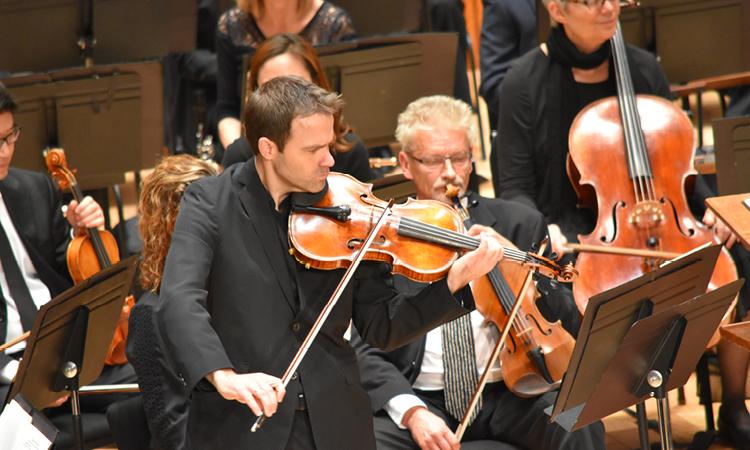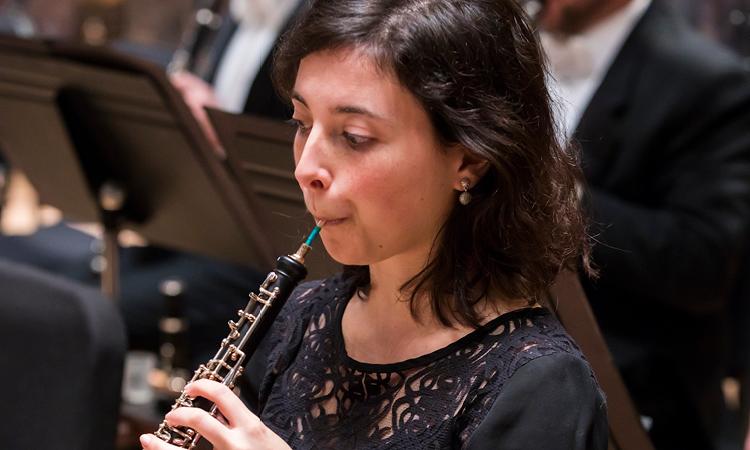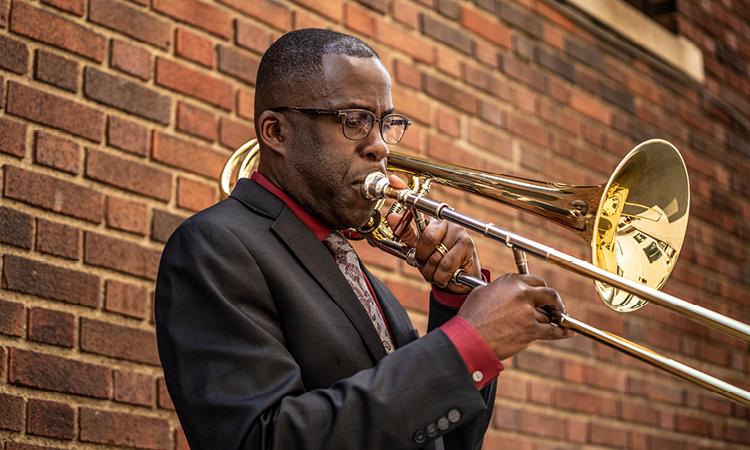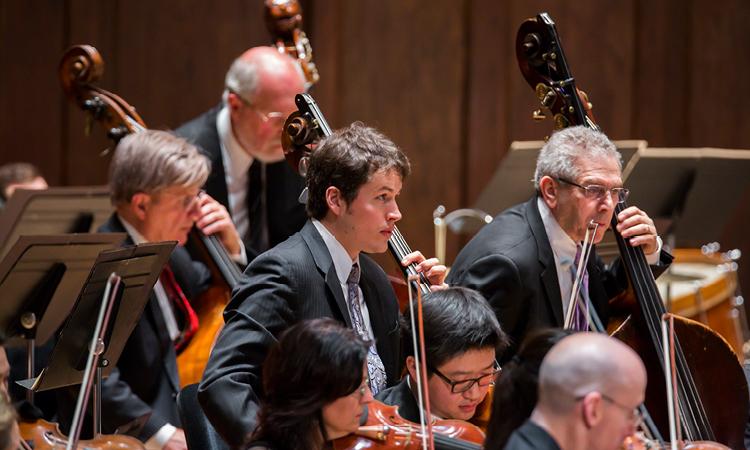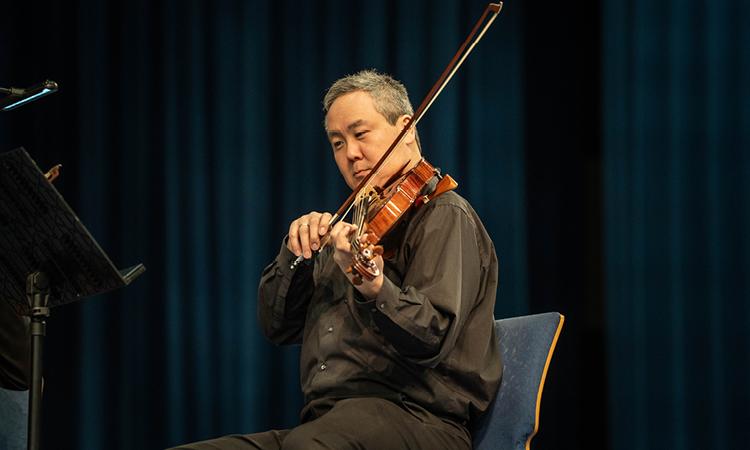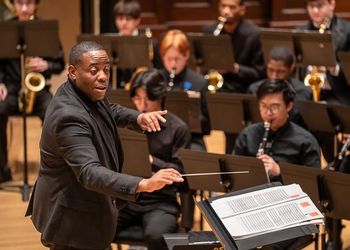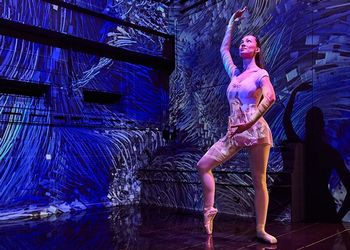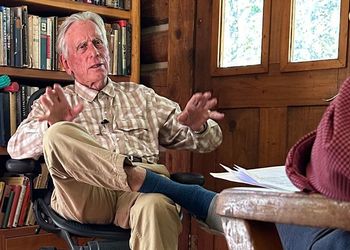A Symphony of Green & White
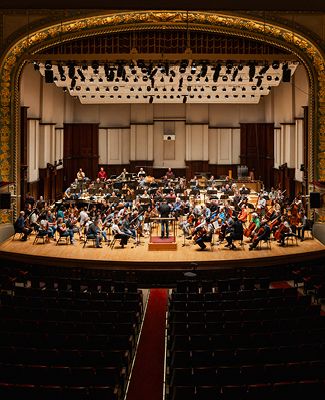
A Symphony of Green & White
Devotion to excellence and the community drives the Detroit Symphony Orchestra. These Spartans are instrumental in helping the DSO flourish and distinguish itself from its peers.
March 18, 2025The late John Mack, longtime principal at the Cleveland Orchestra and one of the foremost oboists of his day, hung a framed embroidery in his classroom at the Cleveland Institute of Music. A quote from his father delicately stitched into the pattern:
“Do not take ‘no’ for an answer from inanimate objects.”
When his students grew frustrated handcrafting their own reeds, Mack often repeated that phrase. The oboe, he reminded them, demands more from its musician. The structure of the instrument’s double reed is similar in complexity to human vocal cords, and its labored construction is fundamental to the art. If Mack personally found the process tortuous (like many do), it was a feeling he rarely expressed.
Others have been more candid. Oboist Josh Kornbluth decried reed-making a “masochistic habit” likened to the Greek myth of Sisyphus—a tyrant punished by the gods to push a large boulder up a mountain only to have it roll down the other side, repeating for eternity.
Somewhere on that philosophical spectrum is Sarah Lewis, assistant principal oboist with the Detroit Symphony Orchestra (DSO) and a 2009 Michigan State University graduate.
“It’s easy to get frustrated sometimes,” she says, “but it’s about personal control. We’re making our instruments all the time, which is challenging, but it also gives us freedom. It’s very time-consuming and a big source of stress, but when you get that one reed you love and make the music you want with it, it’s very rewarding.”
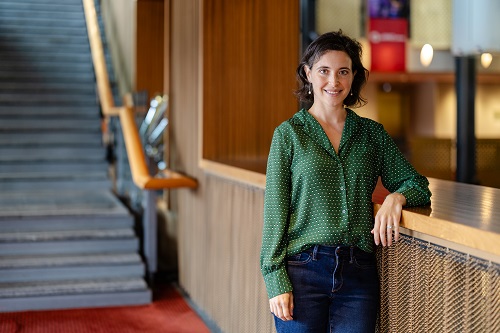
A room in Lewis’ home is dedicated to the arduous task. Using ominous-sounding machines like a guillotine, gouger and splitter, a single tube of cane is guided through a process of cutting, folding, tying and scraping. Different methods yield different results with small changes creating broad variations in vibrancy and tone.
The hours-long process is a highly personal chore. With a focus on quality over quantity, Lewis might produce just one high-quality reed and a pile of discarded duds in a week. But even good reeds break down quickly meaning the process is truly never-ending.
Lewis embraces it in an almost spiritual way. “Every day you either win or you learn,” she says. You’ve either created a good reed or a lesson, or, as she calls it: the growth mindset. Personal pedagogy in pursuit of the greater good. “If you can become a better reed maker, you’re about to be a better player and contribute in a more meaningful way in the orchestra.”
That mindset—one of determination, collaborative energy and a devotion to excellence—is the doctrine of a systemic revolution that has swept through the DSO in recent years. Through that change, the orchestra has flourished and distinguished itself from its peers.
Among it all are Spartans, like Lewis, who are natural fits in the transformative culture. Spartans who are woven through the organization at every level—both on stage and behind the scenes—and with an impact on the direction of the orchestra and its integral place in the city of Detroit.
THE TRANSITION
In October 2010, the DSO was embroiled in the most contentious labor strike of its 137-year history. Like many orchestras nationwide, the DSO struggled through the recession to keep the lights on and the music flowing. After six months, the dispute reached a resolution, a new contract was signed and the organization forged ahead into a new era.
The DSO rebranded itself as “the most accessible orchestra on the planet” and began successfully bucking the industry malaise through outreach and innovation. Embarking on a journey of revitalization both economically and culturally, the DSO found itself in lockstep with the city it calls home.
That’s not a surprise, said Jill Elder, DSO Vice President and Chief Revenue Officer and a ’96 Spartan graduate. The orchestra and the city have a symbiotic relationship going back decades—for better or worse.
“The DSO has been present through so much and made the decision to stay in the city when others were vacating,” she said. “We feel we’ve been a catalyst for some of the revitalization.”
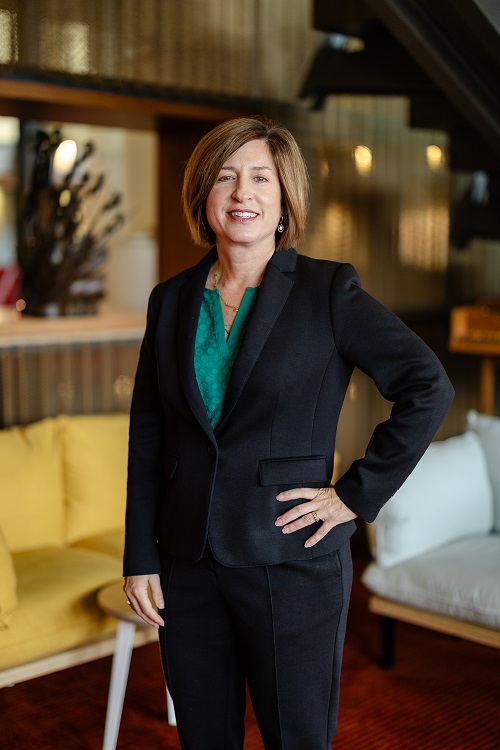
Elder has a passion for Detroit. She started her career at the American Cancer Society, responsible for fundraising and event planning, but as those responsibilities expanded, Elder felt too often pulled away from the city and her family. The DSO brought her back.
“There was so much going on in Detroit that was exciting, and I was feeling less and less a part of it,” she said. “When I was introduced to the DSO, I was excited to have a big change away from public health and into music and being part of the city again.”
Hired in 2017, Elder was part of the new wave in the years following the strike. In her role, she has been crucial in managing multimillion-dollar endowments and promoting the DSO’s Detroit Strategy. The strategy is a commitment to the growth and well-being of the city through public programs like Detroit Harmony, which has united partners—like MSU’s Community Music Schools—to enhance music education across the city.
Damien Crutcher, ’90, is Detroit Harmony’s Managing Director. Like Elder, his impact is created off-stage. That extends to others within the DSO, including Detroit Strategy Specialist Erin Dowler (DMA ’24), Public Relations Manager Hannah Engwall Elbialy (’15) and Digital Advertising Manager Kristin Pagels-Quinlan (’18).
“Right now, the DSO is doing some of the best community work that it’s ever done,” Crutcher said. “Everybody is centered on the people and Detroit. But there’s always work to do. Every musician on stage, everybody at the DSO needs to believe that Detroiters are worth it. We are named the Detroit Symphony for a reason.”
That message is echoed by Elder, who believes that success is not measured in fundraising dollars or ticket sales, but in the bonds the DSO builds within the community. That takes everybody working together both behind the scenes and on stage.
“If we’re all performing at a high level of excellence, supporting each other and helping the DSO be successful, then at the end of the day we’re creating an inspiring and memorable experience for our patrons,” she said.
THE CRESCENDO
When Eric Nowlin was appointed principal viola at the DSO in 2016, he was gifted the rare opportunity to acquire a new instrument—one befitting his position in an orchestra looking to cement its remodeled reputation.
At Orchestra Hall, the concert venue in Midtown Detroit that became the DSO’s home in 1919, Nowlin was presented with a repertoire of violas crafted by 18th-century artisan Giovanni Battista Guadagnini. One after another, Nowlin tested the beauty and vigor of each instrument to find the one that spoke to him.
“It was probably one of the highlights of my life, trying all those great instruments,” Nowlin said.
Nowlin is an assistant professor of viola at MSU—a position he accepted in 2018, enticed by the unique opportunity and what Spartans represent to the world. He is one of four MSU professors with dual roles at the DSO along with Kevin Brown, principal bass; Mike Chen, viola; and Kenneth Thompkins, principal trombone.
“I think almost all musicians teach in some capacity,” Nowlin said. “I always saw myself as an educator, and it’s nice to be able to do that in a university setting.
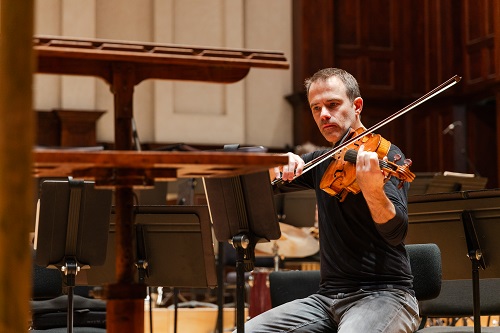
“MSU draws a very diverse group of people. Not only from within the state and from within the country, but also internationally. I have students from all different backgrounds, from all different countries, speaking all different languages. That brings a lot of interest to the studio and a lot of different backgrounds, culturally and musically.”
It is surprisingly rare for universities to employ professional orchestra musicians on staff, Nowlin said, but it’s a place he feels at home. There is a natural connection between the MSU and the DSO—efficient and expressive institutions that foster creativity, value diversity and push the boundaries of what is possible. Both places provide a sense of building something better.
Last June, Nowlin, Lewis and other select orchestra members performed with rapper Eminem at the grand re-opening of Detroit’s historic Michigan Central Station. The pairing may have seemed odd not too long ago, but it is one of the many ways the DSO is bucking trends—an orchestra that is conventional but pioneering, refined but approachable. A wide net is cast to embrace a modern audience; to meet them where they are.
“Now that there’s this rebirth in Detroit, there’s been more variety the orchestra offers,” Lewis said. “We’re not just doing classical pieces. We’re doing new works, works by female composers and minority composers. We do music that will interest someone who has never had an interest in orchestra music. The orchestra is really good about being multifaceted and having something for everyone.”
THE BRIDGE
Kathryn Ginsburg, ’08, entered a tenuous situation at the DSO just five months after the end of the strike in 2011 when she accepted an entry-level administrative position as an operations and pops coordinator.
When the strike ended, many musicians chose not to return while publicly lamenting the regrettable chasm between the orchestra and management. Ginsburg worked to close that gap as she rose through the organization.
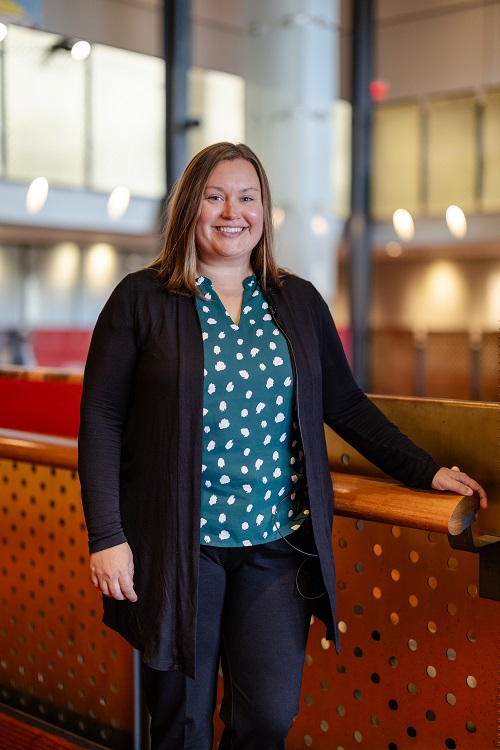
“There was a huge shift to be more collaborative and transparent,” Ginsburg said. “There’s no reason the relationship should be tense. We’re all working toward the same goals, we want to make great music, we want to be sustainable, we want everything to go well. Sadly, that’s not always the case for major orchestras.”
Nobody holds more responsibility for the relationship between the DSO’s two halves than Ginsburg, who was promoted to General Manager in 2022. In charge of the orchestra’s operations and logistics, she manages personnel, stage crew and webcast productions; negotiates musician contracts and disputes; and coordinates schedules and tours.
Ginsburg is a talented musician in her own right, graduating MSU Honors College with a degree in music performance. She also holds a master’s from the University of New Mexico.
“I can think like a musician even if I’m not out there actually playing,” she said. “I want to have a relationship with every person on that stage. I want to get to know them as a player and also who they are and what they bring to the ensemble.”
Her efforts, along with those of music director Jader Bignamini, have not gone unnoticed.
“There’s a very good relationship between the musicians and management, which I can tell you absolutely does not exist in every orchestra. Often, it’s quite the opposite,” Nowlin says. “Even the musicians that have been here for decades, they don’t want to leave.”
That positive effect has spread to the audience, as well.
“At a very basic level, we feel that music is for everybody, and we want to be part of that fabric,” said Ginsburg. “Detroit is more of a destination than it was 13 years ago, and people are including us in their plans when they travel here. I think it’s all connected. I’ve known for years that Detroit is an amazing city and that this is a fantastic orchestra, and now other people are figuring that out too.”
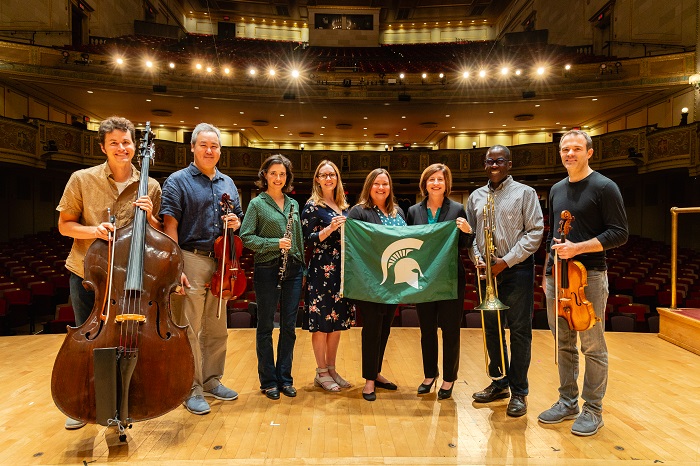
THE FINALE
As a student at MSU, Lewis always felt nervous taking the stage for concerts. In truth, the nerves still get to her. “Maybe that’s part of it,” she said. “Maybe that means you care.”
Last spring, she returned to campus with the DSO for a performance at the Wharton Center. It was her first time playing there since her school days, and coming home provoked a wave of emotions. Anxiety, of course, but also a sense of pride and hope.
“Even though I graduated 15 years ago or so, it made me snap right back to that time in my life,” she said. “It reminded me of how far I’ve come, in a sense, but that there’s so much more to learn still. It was fun to see the same place where I used to play, and the audience was great. I really hope we play there again, maybe every season.”
That’s a realistic possibility, Ginsburg said. When the Wharton Center was first built in the ’80s, those concerts happened more regularly but faded over the decades. There is a desire on both sides to reignite the relationship.
In the meantime, other ties are developing. In addition to the university’s work with Detroit Harmony, Spartan students in the College of Music have access to unmatched educational experiences through DSO professors on staff, regular guest lecturers and internship opportunities across the organization.
“The main thing is that we’re out there doing it,” Nowlin said. “The daily experience of performing is something that directly informs the teaching. Our students get an experience of how to approach performance, of seeing their professor doing the things they’re talking about. And that’s an experience that they might not find somewhere else.”
Every year, the bond between MSU and the DSO grows. And that, in turn, is feeding the pipeline back to the DSO.
“When I think about MSU, I think about having pride in our state, pride in our institution,” Elder said. “I think of Spartans as being hard-working and charismatic. Those are a lot of the same characteristics that make the DSO a really great place. It’s a natural connection between the two institutions.”
Author: Ryan Loren

